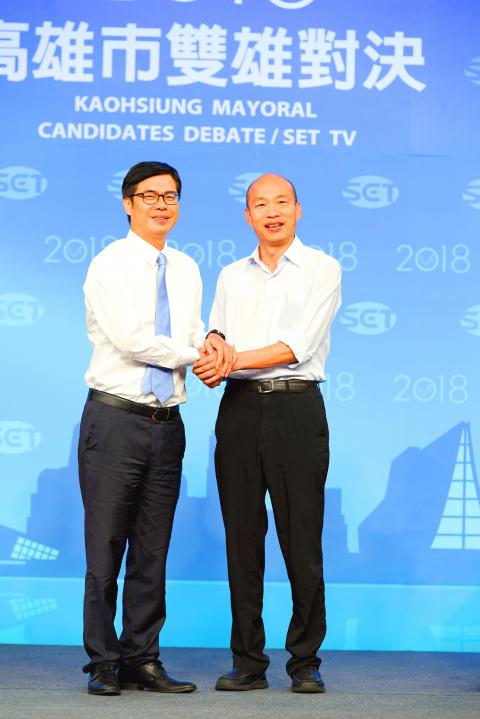The Democratic Progressive Party (DPP) and Chinese Nationalist Party (KMT) Kaohsiung mayoral candidates last night traded barbs on everything from the economy, investment and tourism, to population and administrative competency in their only televised debate of the campaign.
The two-hour debate, broadcast by Sanlih E-Television, began at 8pm with the DPP’s Chen Chi-mai (陳其邁) and the KMT’s Han Kuo-yu (韓國瑜) delivering their opening statements. There were two rounds of questioning before the debate ended with final statements from each candidate.
Kaohsiung, which has been run by DPP members for 20 years, has become the site of one of the hottest mayoral races in the nation.

Photo: Chang Chia-ming, Taipei Times
People should not abuse or trample Kaohsiung for the sake of an election, Chen said, adding that it did not have to be him who gets elected, as long as it was not Han.
“Elections are temporary, but Kaohsiung is forever,” Chen said.
“How [were KMT Chairman and former Kaohsiung mayor Wu Den-yih’s (吳敦義) remarks last week] different from Han calling Kaohsiung ‘old and poor,’” he said.
Wu on Sunday apologized for referring to Presidential Office Secretary-General Chen Chu (陳菊), who was mayor of the city for almost 12 years, as “a fat sow.”
“This is the way the KMT has consistently treated Kaohsiung,” Chen said.
He promised to create a point of contact to attract businesses and investments, open a science park in Ciaotou District (橋頭), connect Kaohsiung and Tainan via a “technological corridor,” and bring in more than NT$600 billion (US$19.4 billion) in economic output.
“Kaohsiung needs to move forward, but not by drilling for oil near Itu Aba (Taiping Island, 太平島) or building a Ferris wheel motel near Love River (愛河),” Chen said, adding: “If [Han] were willing to take back these unrealistic policies, [he] would earn my respect.”
Han said that his remarks about Kaohsiung being “old and poor” had been proven by Chen’s earlier admission that “the city is confronting issues of an economy in transition, a graying population and fiscal imbalances.”
“Shutting people down for saying things that are true is the reason those problems are not solved,” Han said.
Kaohsiung’s municipal debt of NT$250 billion to NT$300 billion is the highest in the nation, while it also ranks lowest for population growth, employment opportunities and youth unemployment, while its share of people with middling to low income and violent crime is outsized, he said.
“Those are the realities of Kaohsiung that we should confront bravely,” Han said.

INVESTIGATION: The case is the latest instance of a DPP figure being implicated in an espionage network accused of allegedly leaking information to Chinese intelligence Democratic Progressive Party (DPP) member Ho Jen-chieh (何仁傑) was detained and held incommunicado yesterday on suspicion of spying for China during his tenure as assistant to then-minister of foreign affairs Joseph Wu (吳釗燮). The Taipei District Prosecutors’ Office said Ho was implicated during its investigation into alleged spying activities by former Presidential Office consultant Wu Shang-yu (吳尚雨). Prosecutors said there is reason to believe Ho breached the National Security Act (國家安全法) by leaking classified Ministry of Foreign Affairs information to Chinese intelligence. Following interrogation, prosecutors petitioned the Taipei District Court to detain Ho, citing concerns over potential collusion or tampering of evidence. The

NEGOTIATIONS: Taiwan has good relations with Washington and the outlook for the negotiations looks promising, Minister of Economic Affairs J.W. Kuo said Taiwan’s GDP growth this year is expected to decrease by 0.43 to 1.61 percentage points due to the effects of US tariffs, National Development Council (NDC) Minister Paul Liu (劉鏡清) said at a meeting of the legislature’s Economics Committee in Taipei yesterday, citing a preliminary estimate by a private research institution. Taiwan’s economy would be significantly affected by the 32 percent “reciprocal” tariffs slapped by the US, which took effect yesterday, Liu said, adding that GDP growth could fall below 3 percent and potentially even dip below 2 percent to 1.53 percent this year. The council has commissioned another institution

NEGOTIATIONS: The US response to the countermeasures and plans Taiwan presented has been positive, including boosting procurement and investment, the president said Taiwan is included in the first group for trade negotiations with the US, President William Lai (賴清德) said yesterday, as he seeks to shield Taiwanese exporters from a 32 percent tariff. In Washington, US Trade Representative Jamieson Greer said in an interview on Fox News on Thursday that he would speak to his Taiwanese and Israeli counterparts yesterday about tariffs after holding a long discussion with the Vietnamese earlier. US President Donald Trump on Wednesday postponed punishing levies on multiple trade partners, including Taiwan, for three months after trillions of US dollars were wiped off global markets. He has maintained a 10 percent

TRADE: The premier pledged safeguards on ‘Made in Taiwan’ labeling, anti-dumping measures and stricter export controls to strengthen its position in trade talks Products labeled “made in Taiwan” must be genuinely made in Taiwan, Premier Cho Jung-tai (卓榮泰) said yesterday, vowing to enforce strict safeguards against “origin laundering” and initiate anti-dumping investigations to prevent China dumping its products in Taiwan. Cho made the remarks in a discussion session with representatives from industries in Kaohsiung. In response to the US government’s recent announcement of “reciprocal” tariffs on its trading partners, President William Lai (賴清德) and Cho last week began a series of consultations with industry leaders nationwide to gather feedback and address concerns. Taiwanese and US officials held a videoconference on Friday evening to discuss the